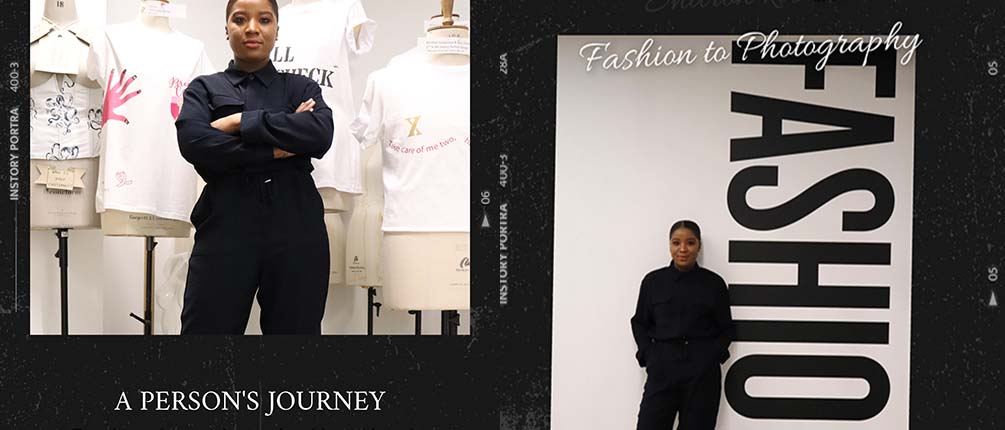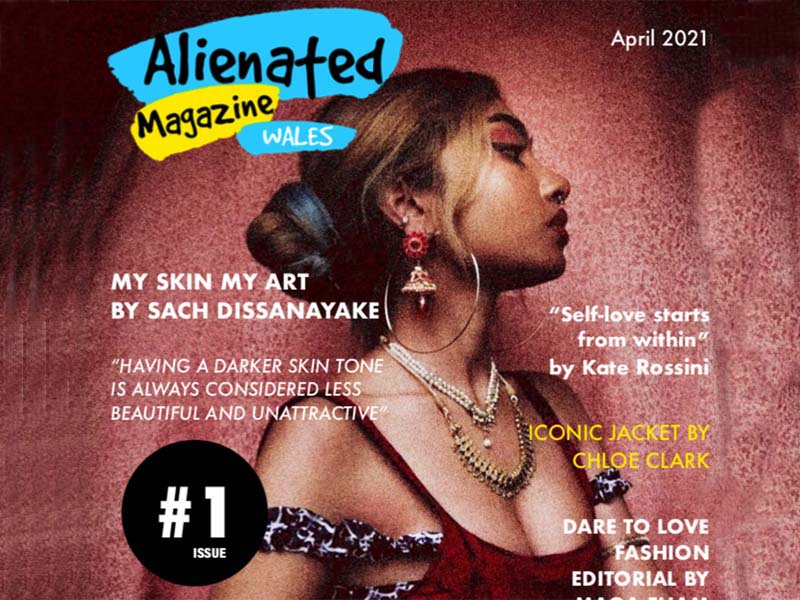A personal life’s story of a young woman finding her way in the creative world.
“I have so many projects on the go I am like a frog jumping up and down “says Sharon Kostini, a bubbly 27 year old, of Sierra Leone/Nigerian parents now living in Cardiff.
18 months of lockdown almost went like a blur with one project coming after the other and some more in the pipeline. For Sharon, it seemed nothing will change soon.
Brought up in a predominately white environment in Athens, Greece, Sharon’s parents wanted her to have the best opportunity and influence. Only Sharon and her sister Fatamata were of colour in her school.
Mixing with other African families only happened twice a year. In December around Christmas and in the summer when three picnic beach parties took place. Initially Sharon’s mother would only allow the young girls to attend one event but as they grew older, they managed to get to all of them. “I loved the association and friendship of other black kids and listening to their stories” Sharon remarked. The sisters kept in contact with these African friends and often met in parks around Athens without parental knowledge.
Her mother, Hawa, is a hairdresser from Sierra Leone, a trade that Sharon has used successfully in the recent past. Her Stepfather, Charles, is a successful businessman from Nigeria. He kept the African culture strong in the family by regularly bringing Nollywood films home to watch. Sharon remembers this time fondly, “not only was it a way to connect with Africa, she says, but also to get closer to my stepdad and that was really nice”.
Pounded yam and fufu (a mash or mix made of cassava or plantain), were essential West African dishes served in the household. These African dishes along with music were a big part in keeping the culture alive in the family. Sharon’s dad was very open and he also wanted them to absorb the Greek lifestyle.
Sharon explains, “the movies, the food and the people really made me want to live in Nigeria. I felt a part of it and still feel a part of the Nigerian culture more so than Sierra Leone. My mother didn’t talk much about her country so as sad as it is to say, Nigeria seems to be the stronger part of me, but I still haven’t visited”.
Coming to the UK in November 2013 aged 20, Sharon was astonished to see how multicultural Wales is. It was a country with so many black people especially in the Welsh capital, Cardiff. She had never been in an environment like it.
She explains, “To walk into a store and see a black person working in it was really nice. I would stare at the black makeup artist in Boots having only ever seen 2 black people working in a store in Greece”.
“You can imagine how shocking it was walking into a shop and asking to speak to the manager who was black. In my head I just shouted WOW!!”.
I don’t really know why I came to the UK other than I liked the red telephone booths in London as I had seen in the films. They looked appealing and I always wanted to do a photoshoot in them. But the first time I heard of Wales, I thought it was the animal in the sea. I kept telling people in Greece that I live in Wales and they thought I was lying.
My aunt was living in Cardiff at the time and that helped me to settle. It was a big shock when I got to Gatwick Airport and she said,” now you have to get the coach and come to Cardiff. I felt as if I had been scammed”.
Sharon wanted to go to university, but English language was a barrier. At the time she was very shy, not something you would associate with her lively personality now. She went back to college to take A Levels and an entry level in fashion designing at Cardiff and Vale.
“I thought I was destined to be a fashion designer or at least to do something in the fashion industry. I think it was my dad that planted this idea in my head as he kept telling me I would be this great model and fashion designer since I was young”.
“I used to have late night talks with him and he would tell me how I would walk down the catwalk and make a speech thanking him for the support he gave me, so yeah, it was definitely him that influenced me. He still lives in Greece to make sure I have a home there. I did a bit of modelling when I was young and had ambitions, but I didn’t get tall” she said laughing out loud".
The smile remained as she continued, “When I was young, I was actually tall for my age. I had long legs and people thought I would be at least 5’ 10” but I didn’t get past 5’ 3”. It was quite disappointing”.
The initial shock of the coach journey to Cardiff soon passed, “To be honest, coming to Wales was the best thing. I love it. I don’t know how I would have survived in London, it's too chaotic. It’s a mess, you can get swallowed up in London and the underground. I don’t know why people like the underground trains, I prefer taking the bus. I don’t care if it takes 10 hours, I just love seeing the city rather than being packed like a fish underground”.
“I like observing, I actually do it a lot and sometimes, I don’t think people like it. Especially if they have a good outfit or hairdo or something different, I don’t know how to be discreet. Even in the church I sit in the back row so I can see everybody. The priest and everybody else that walks in, I can’t help it”.
Despite the ambition Sharon hit a stumbling block. “When I realized I wasn’t that talented, it was hard as I knew what I had planned wasn’t going to come to fruition”.
A smiling Sharon says, “I wanted to be this big fashion designer, the first one in Sierra Leone but I realized I didn’t have the patience for sewing. I could have been a great illustrator and designed my own clothes and given it to somebody else to sew but there is a saying ‘if you want to do something well do it yourself”. So, I thought if I can't make the clothes maybe I can still work with clothes”.
“I thought of becoming a stylist, but I knew there were not so many jobs in that area. Fashion magazines look at and know how to style their clothes, and to work as a celebrity stylist is even harder with the connections and networking so I thought what if I try other creative avenues such as being a creative director looking after the photography, the hair, make up and I just love the chaos of that world”.
“I think that’s where I am now as I wouldn’t call myself a photographer as I get involved with everything. If I get a model and she doesn’t know how to do her make up I am willing to help with styling and even do her hair.
She continued, “Growing up with a mother who owns a hair salon has obviously helped. I was expected to help. It has come in very handy now, so I have to thank my mama for that”.
More and more, Sharon is picking up a camera to take the fashion shoots herself. But it's not just the taking of the picture that’s important to her as she explains - “Photography has become really important for me. I think this is because of my love of telling stories. When I was younger, I didn’t tell stories but I loved to listen. My sister would tell me stories trying to get me to sleep but she was always the one falling asleep because I never wanted to sleep, I wanted to listen to the story. I think this is where my love for storytelling started and now, I am using fashion for my story telling”.
“I like using things that are important to me, like African Pride. If you are black, it doesn’t matter what shade you are. It's important to feel proud in your skin, feel proud within your culture, and heritage. I enjoy telling stories about women. As a black woman I understand my struggles, and I understand about not feeling comfortable in my own skin and body”.
“I have suffered from acne for several years since I was 20. It made me feel ugly. I know women feel the same way about their skin issues and sometimes it could be for other reasons. It’s not common for black women to have acne and it’s a misconception that black women have perfect skin. You are always stigmatized, people pointing fingers at you and I understand that – I have experienced that”.
The confident Sharon of today has not always been this way, “I have struggled to even take pictures of myself without make up. I have to take 500 pictures just to get one that I like and then, it is when my face is not showing completely. But lately, through my work, I am building up my strength and assertiveness”.
As she is trying to make a difference for others, Sharon looks up to and admires the work and stance that Keke Palmer has taken on skin issues.
“The American actress has far worse acne than I have experienced and she is a role model. She always talks about it without makeup. I always look up to her and, wow, if only I could pick up the camera without make up so people could see me for who I am and not always hiding behind makeup. But I have been shamed so much for my acne that I don’t actually have the strength or confidence yet but my work is most certainly helping me cope”.
Sharon’s work and projects are taking her down many paths. From personal to the professional. Though closely connected, as she explains, “I also look at history for my ideas and I am fascinated by the Pre Raphaelite beauty standard set in the 19th century where the ideal beautiful woman had to be pale skinned with dark long hair, sitting in a garden waiting for a prince. I wanted to explore those beauty standards so I recently did a shoot entitled Redefining the Beauty Standards of the 19th Century, using a dark-skinned model to say ‘this is beauty’. All shades are beautiful, and this is what I am trying to tell people''.

“Now I am thinking of looking at other art movements to find the challenge of the story within. It may be controversial and some may find it offensive. I am not saying these people are wrong in their approach but I want a bit of diversity”.
“What I enjoy is the positivity I can pass on to the models and people who participate and collaborate in my work and the people that see the work.
To see them smile and to know that they have made a difference and I have made a difference with them”. “My aim is to make people think why this issue is being addressed and maybe make them think that there has to be more discussions about it”.
“It is about starting a conversation. Nothing will be solved by a picture of a person with no makeup but maybe if we start a conversation about skin issues, we can start talking about it and getting used to fact that skin problem are real. Individuals can start to make changes.
I want to start seeing this person with not so perfect skin on the cover of a magazine and when people see the cover picture, they don’t have to stare or made rude comments. People need to be polite and don’t need to stare and make nasty comments”.
“I hope I give those who take part or those who share the same ideals as me confidence to express themselves”. It seems to be working as just recently she created a project and had an unexpected conversation with a friend.
“Even one of my models from Sri Lanka has told me because of her unique fashion sense, she might face difficulties finding a partner back home. This is influenced by the beauty ideals and expectations men have for women.
“The fact that I told her she is beautiful empowered and motivated her to believe in herself. I have continuously used her on many shoots and now, I don’t think anybody can tell her otherwise”.
She added, “It’s sad it took her so long to believe in herself and I am so happy to be sharing that little joy. “That is what I am pleased about, breaking down barriers and through my projects people are getting the recognition, the approval, from me and others”.
Sharon is not one to be standing still for too long as she tells me, “I want to create more projects on women and children and recently started something with kids 5 -12 years old for Black History Month. I am dressing the kids as adults and photographing them in the streets of Cardiff, in African shops and doing their hair to show how we connect with our culture. The one thing we love doing, especially on a Sunday for Church, is to dress up. And we love to wear our African attire, and so I thought if I put the kids in those places, I can emphasize how we experience our culture in a foreign land”.
Though spreading herself far and wide, one initiative has taken up more time than any other over the past 12 months. Sat on my desk is a quality glossy magazine with her name on it entitled ‘Alienated’. She admits it has been an experience being the force behind it but an exceptional learning experience to be repeated.
She explains, “During Lockdown in March 2020 in my final year of University I had to create something to show my portfolio of work so I decided to produce a magazine for my final presentation. My multi-tasking came in handy as I needed to be a photographer, a designer, editor, copy editor, creative director the list goes on. I did all the work myself, but the idea was to make it bigger and better so then it was looking for the right people for the right jobs”.
PICTURE FRONT COVER OF ALIENATED
“Laredina, a graphic designer friend from Greece, now in Sweden, took it upon herself to re-design the magazine, with input from myself. To give it more content, friends submitted articles and photographs and with the help of Mr Tony Ogunsulire, my boss at Steps4change and a sponsorship from Minds and Comic Relief, the first full blown Alienated magazine was produced. We initially made mistakes which were soon corrected but I am so proud to have created a team that created a product that can be used to raise awareness and give likeminded people a platform”
Looking through the magazine, the professionalism stands out. It is full of quality photography taken by Sharon and others. It has a lot of colour and vibrancy making you want to read and explore every section of the magazine. Sharon is fond of the story the magazine means to share but why name the magazine ‘Alienated’?
Sharon explains, “The name came to me as it was how I felt at the time. After living in a huge apartment full of people, they all left and I spent 6 months living alone because of the lockdown. It was also about my art and the struggles I have gone through and how I have found others with the same issues. It can seem a bit alien for other people who don’t understand so I thought it was the perfect title and hence why the slogan beneath the title reads ‘for the unseen and unheard creative young minds.
So many projects produced, so many in the diary for the next 2 years and another Alienated magazine on the boil.
The frog is most certainly jumping for a while yet.
See Sharons work in the picture gallery .
Websites
Sharonkostini.com
@sharonitakostini
@kostinistyle
This email address is being protected from spambots. You need JavaScript enabled to view it., This email address is being protected from spambots. You need JavaScript enabled to view it.
If you suffer from ACNE
www.acnesupport.org.uk, www.knowyourskin.britishskinfoundation.org.uk





